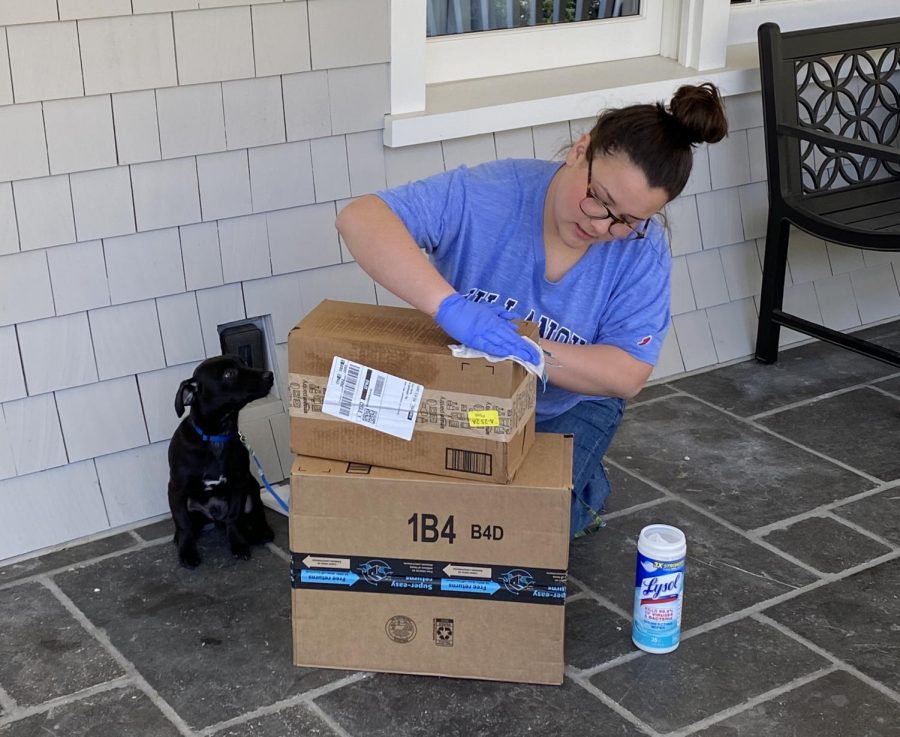Should I stay or should I go?
Sophomore Ella Mathas disinfects packages that were delivered to her home, to ensure the safety of her family. Her grandparents are currently living with her, and are considered to be high-risk under CDC guidelines for COVID-19.
March 22, 2020
I have been practicing social distancing for over two weeks, starting on Friday, March 6. Not a single member of my family has left my house since then, and we now know that nobody in my family has contracted COVID-19 as the two-week incubation period has already passed. That said, we still are going to maintain our distance from the rest of society for the foreseeable future.
As lonely and annoying as this experience has been thus far, I feel that I am just doing my part in making the world a healthier and safer place. While I recognize not everybody has the capability nor privilege to mirror my actions, we all must do the best we can in our given environment. By staying home, we can better protect and respect the efforts of those who have no choice but to leave their homes or work throughout this crisis.
If every individual does their part, we can minimize our societal effect on our environment. This idea is the same sentiment at the core of the climate change movement; if we all live sustainably then we can save the Earth, a theory that many in the New York area subscribe to.
That said, I find it hypocritical that many of my fellow classmates, who skipped school to participate in the Climate Strike this past year, show little to no care about COVID-19, and the potential effects it has and will continue to have. While it is true that people under the age of 30 have yet to experience many of the same, life-threatening symptoms as countless other, older victims, that does not justify vacations, parties, or frequent outings. Even if your ill-advised actions do not affect you personally, they have the potential to kill people, specifically those who are older or have compromised immune symptoms.
We did not march at the Climate strike because we personally experienced the increasing wildfires, the degradation of soil, or the absence of clean water, but we marched for those that do suffer through these effects of climate change and do not have the power to spark change. The same concept applies to COVID-19; I have not been sitting in my house for 16 days because I fear the virus could kill me. I do it because I, as a potential carrier, could kill others.
Quite frankly, although it may sound somewhat extreme, leaving your house at this time can be considered a form of reckless endangerment. By doing so, you are “creating a substantial risk of serious physical injury to another person,” as defined by the law. For example, the reason there are such harsh punishments for those who drive under the influence of alcohol or other intoxicants is because they are more likely to take someone else’s life than their own.
As inconvenient as it may be, do not leave your house unless it is an absolute necessity. The only people who should be out of their house at this time are those who truly have no choice, whether they need to support their family economically, physically care for their family, or they are required to work. For many of the students at The Masters School, you do not fall under this criteria.
There will be few other times in your life when you can be a power for good just by sitting on your couch in your pajamas, reading a good book or even watching a movie. Do the right thing. Stay home.





Catherine Smith Appel • Mar 25, 2020 at 12:44 PM
Tim I’m beyond moved and so in awe of your ideals and actions behind these incredibly important words of wisdom… while it is so difficult to wrap our heads around this pandemic because many of us have been living such privileged lives here in Westchester County it is so real and life threatening! Thank you so much for speaking out and for being so extremely socially responsible… I know this will make a very positive impact.
Kristen Rosolanko • Mar 23, 2020 at 2:17 PM
Tim~
It is my hope that all young people read your post and take it to heart. I’m truly impressed. You are wise beyond your years -it’s no wonder why your family is so proud of you! Keep up the great work!
Mary Gabriel Sternberg • Mar 23, 2020 at 12:09 PM
Your article is spot on! I agree with you 100%. We all need to do our part to halt the spread of this herific virus! I will share your article on FB so hopefully others will share it as well.
Your parents are so proud of you! Well done Tim!
Stay safe!
Kind Regards,
Mary Gabriel Sternberg